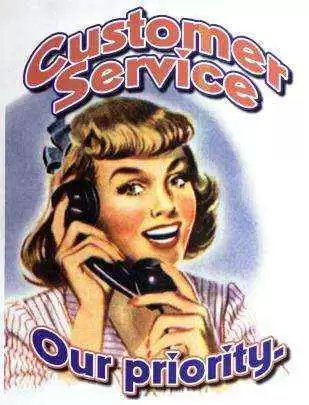
This article originally appeared in the Summer 2003 edition of Celiac.com's Open Original Shared Link.
Celiac.com 07/05/2010 - When “our product isn’t gluten-free” doesn’t necessarily mean “our product isn’t gluten-free”
Celiac.com Sponsor (A12):
You’ve found a food you’d really like to eat. You’ve read the label, and it looks as though the product might be gluten-free. You’re drooling! You can dig in, right? Wrong. It’s a good idea to call the manufacturer to confirm that there aren’t hidden sources of gluten.
Years ago, when we would call manufacturers and ask them if their products were gluten-free, they would either suspect us of making a crank call and hang up, leave us on “hell-hold” for 35 minutes while they “checked” (a euphemism for when they put you on hold and hope you hang up), or respond with a confident, “Oh no, honey, there’s no sugar whatsoever!”
Before you bother calling the manufacturer, read the label. If there is an obviously unsafe ingredient, don’t waste your time or theirs. Tune in to the person on the other end of the phone. Do they sound like they understand what you’re talking about? Are they giving you conflicting information? Can you trust what they say?
Fortunately, most product labels have a toll-free phone number listed on the packaging. I highly recommend carrying your cell phone in the grocery store with you, so that you can call quickly while you’re still there—before you buy a product. These days, most customer service representatives actually know what we’re talking about most of the time, and can offer a knowledgeable answer that instills confidence that the answer is accurate, albeit sometimes not all that helpful. When you call a company to find out if its product is wheat or gluten-free, you’ll get one of four responses:
No, our product is not gluten-free: Do not interpret this as meaning, “No, our product is not gluten-free.” I realize that’s what they said, but it may not be what they mean. Probe deeper by asking, for example, “Can you tell me what in your product has gluten in it? I read the label and didn’t see anything questionable.” One time when I asked this, the woman told me it was “whey” that contained gluten. Penalty flag! Whey doesn’t contain gluten! This is when you need to realize that you’re talking to someone who doesn’t understand the concept, and you should ask to be transferred to a quality control supervisor.
Sometimes this response is accurate, and either an ingredient wasn’t clearly called out on the label (unfortunately, this still occurs from time to time), or you were calling about a questionable ingredient only to find out it’s a good thing you called.
We can’t verify its status: Translation: “It’s wheat-free/gluten-free, but we’re covering our rear ends because we don’t want someone to sue us.” Sadly, in our litigious society, it may actually be a founded fear that they have.
Of course, this response—”we can’t verify its status”—could actually mean what it says—that they can’t verify the status. Usually they’ll tell you this is because they get their additives from other sources, and even though they claim to be gluten-free, Company A doesn’t want to be responsible in case Company B used gluten. The risk factor in either case is probably low.
Every now and then, this response is given because they have an “If we tell you what’s in our product, we’d have to shoot you” mentality. Assure them that you’re not trying to steal their oh-so-treasured secret-sauce recipe, but that you have a serious medical condition that requires you to know if there are certain ingredients in the food you eat. Sometimes you just can’t get an answer, in which case you fall back to the golden rule: When in doubt, leave it out!
Yes, it is gluten-free: This doesn’t necessarily mean, “Yes, it is gluten-free.” You have to judge for yourself whether or not they truly understand the concept. Sometimes they’ll follow it up with, “There are no sources of wheat, rye, or barley, and there are no questionable additives. Therefore it’s safe for someone with celiac disease, gluten intolerance, or wheat allergies.” Ah, you just want to kiss these people. Other times, when pressed, they get squirmy. If you say, for instance, “Oh, okay, then I can assume the modified food starch is derived from a non-gluten source?” and they give you an audible “blank stare,” you might want to dig a little deeper before trusting their answer.
Huh? Thankfully, this isn’t a common response anymore, but it does happen. Politely try to explain what types of ingredients might be in the product you’re calling about, and if it doesn’t “click,” ask to speak to a quality control supervisor or nutritional expert.
Of course it’s helpful and sometimes necessary to be specific in some cases, saying, “I’m calling to see if this product is gluten-free, which means it doesn’t contain wheat, rye, or barley.” Not only is this clarification helpful for them, but you may have educated one more person about gluten.
Many times, one of the added benefits of calling, even if the product you were calling about turns out not to be okay, is they’ll offer to send you a list of their wheat-free/gluten-free products (sometimes they even toss in a few coupons). Always take them up on it, and save the lists for future reference.
It’s important to learn from your answers. If there was an ingredient on the label that you had never heard of, and you talked with a knowledgeable customer service representative who told you that product was gluten-free, take note. That means the ingredient is gluten-free, too. Add it to your own copy of the safe and forbidden list, and remember for future label-reading experiences.
Excuse me for a moment while I put on my Miss Manners hat, but it’s important to be polite, professional, and appreciative when you call manufacturers. Not only will you get much better service, but we need them! We need them to comprehend the gravity of our questions and to understand how important it is to be 100 percent sure that the answers they give us are accurate. We need them to realize that they can’t guess at their answers, and that we very much appreciate that they understand what we’re asking.
Calling manufacturers can be a pain, for sure, but it’s an important part of living and loving the gluten-free lifestyle. Not only is it a good habit for you since ingredients change frequently, but it sends companies the message that if their labeling was clarified, we wouldn’t bother them so often! It also tells them that millions of people avoid wheat or gluten, and maybe they’ll think twice before using an ingredient that has a wheat source when they have the option to use one that is wheat and gluten-free.
This article was partially excerpted from Danna’s book Wheat-Free, Worry-Free: The Art of Happy, Healthy, Gluten-Free Living.










Recommended Comments
There are no comments to display.